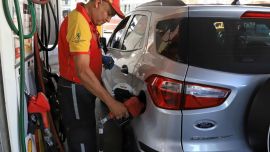While Alberto Fernández hogged the spotlight this week with his racist gaffe, a digital auction held by Sotheby’s netted US$17.1 million selling digital art, including a CryptoPunk known as “Covid Alien” that went for US$11.75 million. Indeed, a new report indicated that Argentina ranked 21st in the world in realised bitcoin gains last year, with some US$200 million. And, as Economy Minister Martín Guzmán dukes it out with Buenos Aires Province Governor Axel Kicillof and Vice-President Cristina Fernández de Kirchner over energy subsidies in an electoral year, they’ve helped feed a boom in crypto-mining given dirt cheap residential electricity costs.
Despite the extreme volatility in the cryptocurrency market that saw bitcoin’s price surge 550 percent to a record above US$60,000 in a matter of a few months, only to come crashing down below US$35,000 just 13 days later, there’s a crypto-boom going on across the globe. Argentina’s economy is prime breeding ground for the crypto-world. Stuck in a decades-long economic downturn with its consistent gusts of stagflation, administrations of all colours have relied on price freezes and currency controls to try to put a lid on inflation. Yet, the destruction of purchasing power continues unabated, leading many to try and find their way into US dollars paying a massive premium for the so-called “dólar blue,” currently at 58 percent. According to a report by economic daily El Economista, Argentines hold some US$130 billion within the financial system — estimated to represent about eight percent of the actual physical stock of dollars in the world — and another US$175 billion “under the mattress,” as we like to say. Cryptocurrencies are already being used to convert pesos into dollars circumventing government restrictions through peer-to-peer transactions at more competitive exchange rates than the aforementioned blue-chip dollar, with said transactions rising from under US$200,000 in late 2019 to US$600,000 last year, according to data from ChainAnalysis.
In the heat of an electoral campaign, the ruling Frente de Todos coalition is having an internal power struggle regarding the election of an economic plan. Guzmán sought to reduce the fiscal deficit, even in the midst of an explosive recession exacerbated by the latest bout of Covid-19 infections and deaths. Guzmán is in Fernández de Kirchner’s crosshairs – she believes ex-president Mauricio Macri lost the elections by hiking public service bills during a recession. The populist promise of cheap energy has become a crypto-miner’s dream.
Bitfarms is a publicly traded bitcoin mining company that announced it was ramping up its operations in Argentina from 60 megawatts to 210, “sufficient to support approximately 55,000 new-generation miners, which could generate approximately US$650 million in revenue.” In the same statement, Bitfarms indicated the breakeven cost of mining a bitcoin in Quebec, Canada — where they have operations — stood at US$7,500 in the fourth quarter of 2020, compared with an estimated US$4,125 in Argentina, if their facility was up and running at the time. Electricity makes up about 75 percent of mining costs, which helps to explain the math behind paying for subsidised energy in pesos, only to turn around and offload bitcoins and ether — the second-largest cryptocurrency — at a premium over the official dollar exchange rate. Argentina has over 20 crypto-farms already, with several taking advantage of cold weather in Patagonia to lower cooling costs.
As most things in the cryptoworld, the latest craze has been about NFTs, which stands for “non-fungible tokens.” The market grew explosively and, of course, crashed quickly. These NFTs are tied to pieces of digital content such as sports highlights or digital art, and then sold. The Sotheby's auction mentioned above followed a sale by rival auction house Christies in March, which crowned an artist named Beeple as the third-most expensive living artist, selling a single NFT for more than US$69 million. Argentina’s creative community, reputed to be quite good and relatively cheap, has a big opportunity in the burgeoning world of NFTs, with several of them involved in major projects from the metaverse to digital museums. On the sports side, the Argentine Football Association (AFA) announced a partnership that will make the national team the first to issue its own token, joining a series of clubs including River Plate, Racing Club, and Rosario Central.
All of these things appear to have flourished for a series of reasons. Beyond the proclivity to crisis and currency debasement that inherently makes every Argentine look for constant workarounds, the promise of a future payout has spurred a global crypto-community into action. Whether the technology will build the future of money or its carbon footprint will destroy us, the incentive to jump onto cryptocurrency projects goes hand-in-hand with the potential payday. Yet, one of the main benefits has been that Argentine regulators have yet to regulate the space. That’s not expected to last, as the Central Bank has already begun investigations into nine fintech firms for allegedly allowing depositors to earn interest on their crypto holdings. The National Securities Commission had joined the Central Bank in warning investors to be prudent in their cryptocurrency investments, and the AFIP tax agency has begun snooping around to see if it can take a cut too.
There’s a lot going on in the cryptoworld in Argentina, and until now, it has managed to fly below the radar to a certain extent. Not only are Bitcoin and the rest of crypto assets interesting from a standpoint of financial speculation, they’ve also created a massive hype that has brought along with it creativity and innovation. Argentina has, once again, a very real opportunity to be at the forefront. Hopefully the political class doesn’t notice any time soon.





















Comments